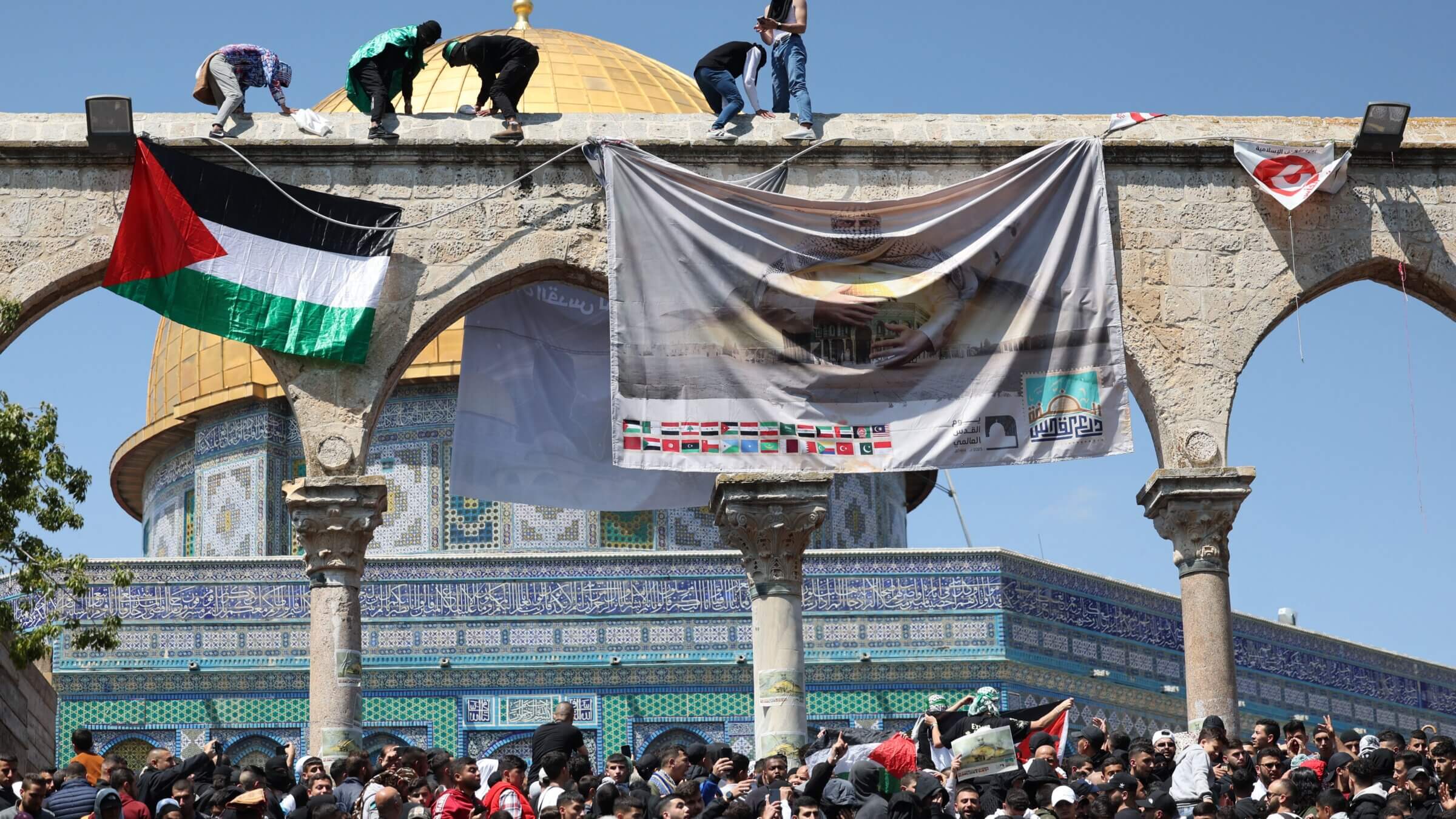Hamas is calling its attack ‘Al-Aqsa Flood.’ Why is the Jerusalem mosque so important in Gaza?
What does a mosque far from Gaza have to do with the violence in Israel?

The al-Aqsa mosque is an important symbol of Palestinian identity, events in the compound frequently spark conflict between Israel and Hamas. Courtesy of Getty Images
After Hamas militants invaded southern Israel and launched a barrage of rockets at Israeli cities in a surprise attack Saturday morning, a Hamas leader named the operation “Al-Aqsa Flood,” saying the attack was “in defense of the Aqsa Mosque.”
The Hamas statements also mention Israel’s blockade of Gaza and Israeli violence against Palestinians in the occupied West Bank as motivation for the attack, as well as stating Hamas’ general opposition to the Jewish state’s existence. And online, some are hailing the attack as the beginning of Israel’s destruction. But the mosque looms large in the justification and imagery Hamas has used to justify its offensive.
Israel, one Hamas statement said, allowed “Jewish groups to desecrate al-Aqsa Mosque;” it also referenced Jewish “intentions of erecting their alleged temple on the ruins of the shrine of our Prophet Muhammad.”
The Aqsa complex, which is also home to the Dome of the Rock, may be far from Gaza in terms of geography, but it is an important Muslim holy site and has long been a flashpoint in the Israeli-Palestinian conflict.
Ariel Sharon’s visit to the site in 2000 helped spark the Second Intifada. Hamas, which governs Gaza, fired rockets into Israel in 2021 in response to an Israeli occupation of the Aqsa complex, setting off a longer and more brutal conflict. Clashes at the site last year also resulted in rocket fire from Gaza.
Why is Al-Aqsa so inflammatory?
Al-Aqsa is one of the holiest sites in Islam; according to Muslim beliefs, Muhammad ascended to heaven from the mosque, which is situated at the top of a hill in the center of Jerusalem’s Old City. But the mosque complex also stands on the holiest site in Judaism, the Temple Mount, site of the First and Second Temples, which contained the Holy of Holies — the dwelling place of God — giving the area symbolic weight in the Israeli-Palestinian conflict. Both Israelis and Palestinians cite their history at the holy site as a proof of their claim to Jerusalem.
Al-Aqsa is seen by many Palestinians as a symbol of their national ambitions, and the desire for a Palestinian capital in Jerusalem. It is one of the only areas in Jerusalem that Israel does not officially consider under its administration, having handed it over to a Jordanian trust known as the Waqf after taking control of the Old City during the 1967 War.
Conversely, some Israelis, including Itamar Ben-Gvir, Israel’s minister of national security, see control of the site as an important expression of Israel’s sovereignty over all of Jerusalem. Israel annexed the largely Palestinian East Jerusalem in 1980, a move that is not internationally recognized. (The U.S. recognized Jerusalem as Israel’s capital during the Trump Administration.)
Control of the complex around Al-Aqsa has long been hotly contested. The presence of Israeli security forces, as well as Jewish prayer at the site, is seen by Palestinians as an aggressive disruption of the status quo.
Prayer at Al-Aqsa as a flashpoint
Even on the best days, the atmosphere at the holy site is tense. While Muslims regularly pray at the mosque, Israeli forces sometimes limit Palestinian access. And though Christians and Jews can visit the site, they are not allowed to pray there, per Israel’s agreement with the Waqf. Historically, Israeli police have reprimanded or removed any non-Muslim attempting to pray, due to the fact that even the tiniest shifts in the norms are often interpreted by the other side as an act of aggression.
Yet recently, Israeli forces have quietly allowed Jewish groups to pray on the site, guarding them as they do so. Ultra-nationalist Jewish groups, some of whom advocate for taking over the area in order to build Judaism’s prophesied Third Temple, have made a point of praying there and encouraging other Jews to join them as a form of asserting control over the site.
Judaism’s three pilgrimage festivals — Pesach, Shavuot, and the harvest holiday Sukkot, which ended Friday — are a prime time when Jewish activists attempt to enter the Aqsa complex and pray there.
In a statement about Saturday’s attack, Hamas directly referenced Jewish prayer at the site, calling it an act of “aggression” that “had reached a peak.” Hamas specifically mentioned the blowing of shofars at the complex, as well as the sprinkling of a red cow’s blood — which Jewish texts state is a precursor to the construction of the Third Temple — as proof of their belief Israel plans to destroy the mosque and the entire compound, justifying the attack.
While perhaps ideally, shared prayer at a shared holy site would be possible peacefully, practically speaking, Jewish prayer on the site is a disruption of the status quo often done with geopolitical ambitions in mind. At minimum, it is a demonstration of Israeli control in an area not officially in its power, and yet another loss of Palestinian rights and autonomy in the region. At its most extreme, Jewish prayer signals intentions on the part of extremist religious groups to rebuild the Jewish temple at the site.
Though Saturday’s attack from Hamas is far from Al-Aqsa, the mosque’s symbolic importance means that any and all shifts in behavior at the area have political and national meaning and consequences. Hamas’ choice to name their attack “Al-Aqsa Flood,” and to tie it to protection of the holy site, seems calculated to garner support from Palestinians in the West Bank and Muslims around the world.

















